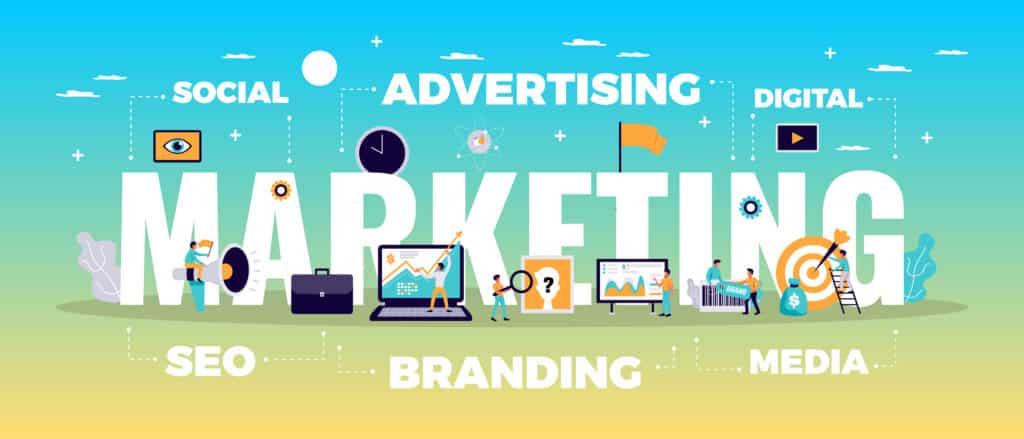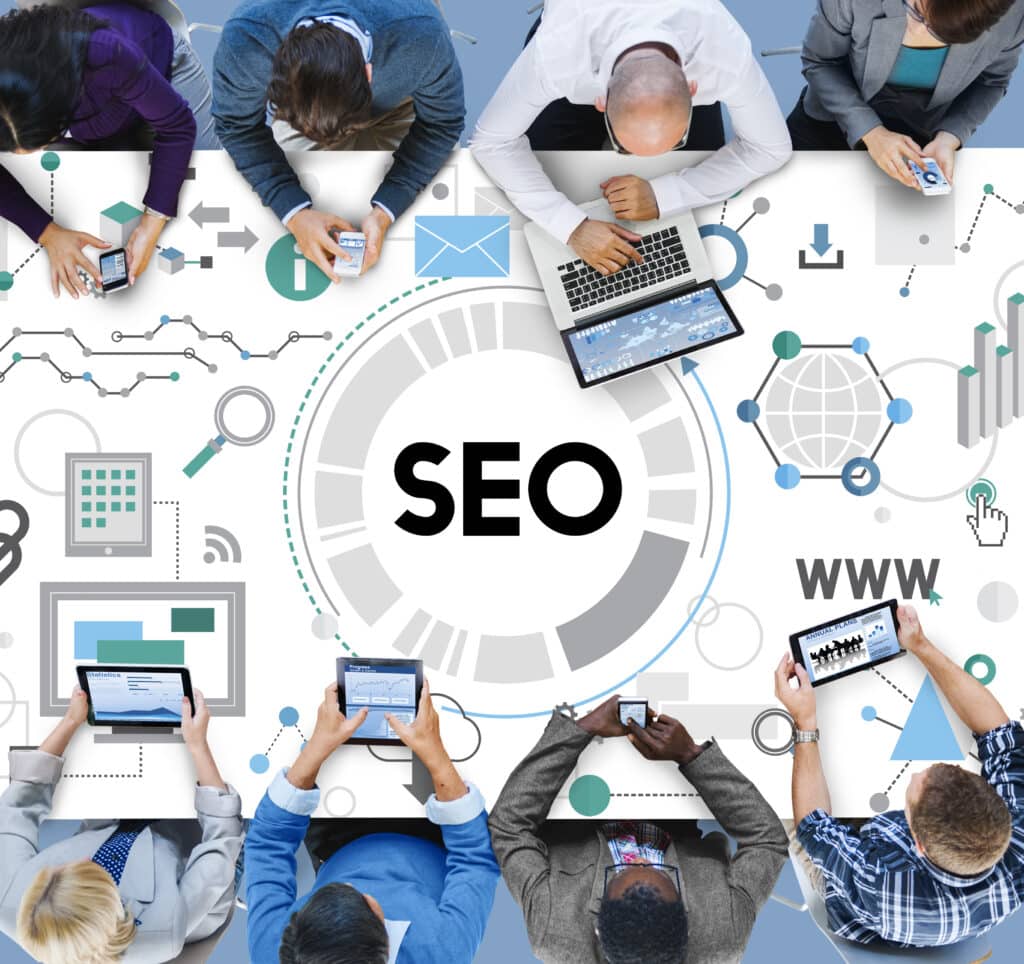Why Digital Channels in Online Marketing is crucial in New Zealand
In today’s digital world, online marketing is critical to every business. The number of Internet and social media users is increasing every year. Businesses of all sizes, from all sectors, are turning to digital marketing to raise awareness and capture the attention of a larger audience to achieve beneficial business outcomes, primarily by advertising their products or services. Digital marketing is becoming increasingly popular in New Zealand as businesses seek to capitalise on the country’s developing digital economy.

Online marketing services, also known as digital marketing services, encompass various tactics and strategies businesses can use to promote their products or services online. Some of the most popular forms of digital marketing include:
- search engine optimisation (SEO)
- social media marketing
- email marketing
- pay-per-click advertising,
- content marketing.
Each type of digital marketing has its own set of pros and cons, and businesses should carefully consider which methods are most suited to their sector and target audience.
Benefits of Digital Channels in Online Marketing in New Zealand
Wide Audience Reach
Digital channels provide access to a large and diverse audience in New Zealand. With a high internet penetration rate, most New Zealanders are active online, making digital media an effective way to reach and engage with potential customers.
Cost-Effective Advertising
Compared to traditional marketing methods like print, radio, or TV, digital channels offer cost-effective advertising options. Businesses can allocate their budgets more efficiently and target specific demographics or regions, ensuring that their marketing efforts generate a better return on investment.
Targeted Marketing
Digital channels enable precise targeting of specific audiences based on demographics, interests, behaviour, and location. This level of targeting allows businesses to tailor their messages and promotions to reach the right people at the right time, increasing the effectiveness of their marketing campaigns.
Measurable Results
One of the significant advantages of digital channels is the ability to track and measure marketing performance. Through analytics tools, businesses can gather data on impressions, clicks, conversions, and other key metrics, allowing them to evaluate the success of their campaigns and make data-driven decisions to optimise future marketing efforts.
Personalised Communication
Digital channels offer opportunities for personalised and interactive communication with customers. Businesses can engage with their audience through social media, email marketing, chatbots, and other channels, providing a more personalised experience that fosters customer loyalty and brand advocacy.
Flexibility and Agility
Digital channels provide flexibility and agility in marketing campaigns. Businesses can quickly adjust their strategies, creative assets, and messaging based on real-time data and customer feedback. This agility allows them to promptly respond to market trends, competitor activities, and customer preferences.
Enhanced Customer Engagement
Through digital channels, businesses can actively engage and interact with customers. Social media platforms, online forums, and other digital communities enable enterprises to listen to customer feedback, address queries and concerns, and build stronger relationships with their target audience.
E-commerce Growth
Online shopping has experienced significant growth in New Zealand, especially with the impact of the COVID-19 pandemic. Digital channels provide a platform for businesses to showcase their products or services, offer seamless e-commerce experiences, and tap into the growing demand for online purchases.
Why a Digital Marketing Agency is a Valuable Partner for Businesses
The Cost-Effectiveness of Online Advertising
Online advertising is a cost-effective way for businesses to reach a wide audience and promote their products or services. It allows companies to target specific demographics and geographic locations and track and measure the success of their campaigns in real-time. In New Zealand, digital marketing services have become increasingly popular as businesses look to tap into the country’s growing digital economy.

Choosing the Right Digital Marketing Company
When it comes to choosing the right digital marketing company in New Zealand, experience plays a crucial role in ensuring the success of your online marketing efforts. Look for a company with a proven track record of delivering results for businesses in your specific industry or niche. This industry-specific experience indicates that they understand your sector’s unique challenges and opportunities and can tailor their strategies accordingly.
Each digital marketing channel has strengths and can contribute to a well-rounded online marketing strategy. Moreover, working with a digital marketing company that offers a comprehensive range of services is beneficial. Look for a company that provides services such as search engine optimisation (SEO) to improve your website’s visibility on search engines, social media marketing (SMM) to engage with your audience on popular social platforms, email marketing to nurture customer relationships and drive conversions, pay-per-click (PPC) advertising to target specific keywords and demographics, and content marketing to create valuable and relevant content that attracts and retains customers.
By partnering with a company that offers a full range of services, you can benefit from a cohesive and integrated approach to your online marketing. Such companies often have specialists in each area who work together to develop a comprehensive strategy that aligns with your business goals. This integrated approach ensures that all digital marketing efforts work together to maximise results.
Also, could you consider the company’s approach to measurement and reporting? A reliable digital marketing company should provide regular updates and reports on the performance of your campaigns, including key metrics such as website traffic, conversions, engagement rates, and return on investment (ROI). Transparent reporting allows you to track the progress of your campaigns, make data-driven decisions, and assess the effectiveness of the strategies implemented.
Lastly, could you consider the company’s communication and collaboration style? Effective communication and a collaborative partnership are essential for a successful digital marketing campaign. Look for a company that values open and clear communication, provides regular updates, and is responsive to your questions and concerns. A collaborative approach ensures that your input and feedback are considered, and the company can align their strategies with your unique business goals and objectives.
In summary, when choosing a digital marketing company in New Zealand, consider their industry experience, range of services offered, approach to measurement and reporting, and communication style. Evaluating these factors will help you select a reliable and competent partner to drive your online marketing success and help your business thrive in the digital landscape.
The Importance of Digital Channels in Online Marketing
Digital channels play a crucial role in online marketing in New Zealand for several reasons:
- Wide Audience Reach: Digital channels provide access to a large and diverse audience in New Zealand. With a high internet penetration rate, most New Zealanders are active online, making digital media an effective way to reach and engage with potential customers.
- Cost-Effective Advertising: Compared to traditional marketing methods like print, radio, or TV, digital channels offer cost-effective advertising options. Businesses can allocate their budgets more efficiently and target specific demographics or regions, ensuring that their marketing efforts generate a better return on investment.
- Targeted Marketing: Digital channels enable precise targeting of specific audiences based on demographics, interests, behaviour, and location. This level of targeting allows businesses to tailor their messages and promotions to reach the right people at the right time, increasing the effectiveness of their marketing campaigns.
- Measurable Results: One of the significant advantages of digital channels is the ability to track and measure marketing performance. Through analytics tools, businesses can gather data on impressions, clicks, conversions, and other key metrics, allowing them to evaluate the success of their campaigns and make data-driven decisions to optimise future marketing efforts.
- Personalized Communication: Digital channels offer personalised and interactive customer communication. Businesses can engage with their audience through social media, email marketing, chatbots, and other channels, providing a more personalised experience that fosters customer loyalty and brand advocacy.
- Flexibility and Agility: Digital channels provide flexibility and agility in marketing campaigns. Businesses can quickly adjust their strategies, creative assets, and messaging based on real-time data and customer feedback. This agility allows them to respond promptly to market trends, competitor activities, and customer preferences.
- Enhanced Customer Engagement: Businesses can engage and interact with customers through digital channels. Social media platforms, online forums, and other digital communities enable enterprises to listen to customer feedback, address queries and concerns, and build stronger relationships with their target audience.
- E-commerce Growth: Online shopping has experienced significant growth in New Zealand, especially with the impact of the COVID-19 pandemic. Digital channels provide a platform for businesses to showcase their products or services, offer seamless e-commerce experiences, and tap into the growing demand for online purchases.
In conclusion, digital channels are crucial in online marketing in New Zealand due to their broad audience reach, cost-effectiveness, targeted marketing capabilities, measurable results, personalised communication, flexibility, customer engagement opportunities, and the growth of e-commerce. Embracing digital marketing strategies is essential for businesses to stay competitive and effectively connect with digitally savvy consumers in New Zealand.

The Role of a Digital Agency
A digital agency plays a crucial role in online marketing by utilising digital strategies and platforms to provide businesses with a wide range of managed services. These agencies specialise in traditional and digital marketing, helping companies develop comprehensive marketing strategies encompassing online and offline solutions. Their expertise enables businesses to reach a broad audience effectively, utilise user research, and promote products or services across multiple channels, ultimately driving online sales.
So, what exactly is the role of a digital agency? Here are critical aspects of their contribution:
- Digital Strategy Development: Digital agencies work closely with businesses to understand their objectives, target audience, and industry landscape. Based on this knowledge, they develop customised digital strategies that align with the client’s goals and utilise various digital channels and tactics to achieve optimal results.
- Multi-Channel Marketing: A digital agency helps businesses expand their online presence and reach a broad audience by leveraging multiple digital channels. This includes social media platforms, search engines, email marketing, content marketing, paid advertising, and more. By utilising a mix of tracks, businesses can engage with their target audience in diverse ways, increasing brand visibility and driving customer acquisition.
- User Research and Targeting: Digital agencies conduct user research to understand the target audience’s preferences, behaviour, and needs. They use these valuable insights to create highly targeted marketing campaigns that resonate with specific customer segments. Businesses can enhance customer engagement and improve conversion rates by delivering personalised and relevant messages.
- Comprehensive Campaign Management: Digital agencies handle the end-to-end management of marketing campaigns. They create compelling content, design eye-catching visuals, execute social media strategies, optimise websites for search engines, monitor campaign performance, and provide regular reporting. This comprehensive approach ensures that all aspects of the campaign are cohesive and optimised for success.
- Data Analysis and Optimisation: Digital agencies utilise advanced analytics tools to measure and analyse campaign performance. They gain valuable insights by tracking key metrics, such as website traffic, click-through rates, conversion rates, and customer engagement. These insights enable data-driven decision-making and continuous optimisation of marketing strategies to maximise results and return on investment.
- Ongoing Support and Collaboration: A digital agency is a long-term business partner, providing ongoing support and collaboration. They stay updated on industry trends, emerging technologies, and shifts in consumer behaviour. This allows them to adapt strategies proactively, suggest innovative ideas, and guide businesses through the ever-changing digital landscape.
In summary, a digital agency plays a pivotal role in online marketing by developing digital strategies, implementing multi-channel marketing campaigns, utilising user research, managing comprehensive campaign execution, analysing data for optimisation, and providing ongoing support. Partnering with a digital agency empowers businesses to harness the full potential of digital marketing, drive online sales, and achieve sustainable growth in today’s competitive digital landscape.
The Importance of Search Engine Optimisation for Digital Marketing
The Basics of SEO strategies
Search engine optimisation (SEO) involves optimising a website and its content for search engines. This includes improving the website’s structure, code and content to increase its visibility in search results. When you appear at the top of search engine results you will can increase their visibility and reach a wider audience.

The Benefits of SEO for Businesses
SEO can help improve a website’s user experience by making it more easily navigable and relevant to users. Additionally, in New Zealand, SEO is becoming increasingly important as businesses look to tap into the country’s growing digital economy. Companies can increase their visibility and reach a broader audience by using web development to optimise their website for search engines.
Partnering with an SEO Expert or Digital Marketing Agency
Working with a digital marketing agency or an SEO expert is essential to develop and executing effective SEO strategies. These professionals have the knowledge and experience to help businesses navigate the ever-changing landscape of SEO and stay ahead of the competition. By partnering with an SEO expert or digital marketing agency, companies can ensure that their website is optimised for search engines and that their marketing efforts are as effective as possible.
The Impact of Social Media Marketing
Social media marketing (SMM) uses ad platforms to promote a product or service. It involves creating and sharing content on social media channels to increase brand awareness and drive engagement with target audiences.

SMM can be a cost-effective way to reach a large audience and build a community around a brand. It allows businesses to engage with their customers in real time, gathers valuable insights about their audience, and creates a more personal connection with them.
Popular Social Media Platforms
Some popular social media platforms for marketing include Facebook, Instagram, Twitter, and LinkedIn. Each forum has unique features and demographics, so businesses must choose the right platform for their audience and goals.
Effective SMM strategies include creating engaging and shareable content, using paid advertising, and building relationships with influencers and other brands.
Why Email Marketing is Important
Email marketing allows businesses to target specific groups of customers and personalize communications. It also has a higher return on investment than other forms of marketing, such as social media or paid advertising.
How to Make Your Email Marketing Effective
- Segment your email list so you can send personalized and relevant content to different groups of customers.
- Use a clear and compelling subject line to grab the recipient’s attention.
- Optimize the content of your emails for mobile devices, as most emails are now opened on smartphones.
- Use a clear call-to-action to encourage recipients to take a specific action, such as making a purchase or signing up for an event.
- Test and measure the results of your campaigns to identify what works and what doesn’t.

Tips for Email Marketing Success
- Keep your emails concise and to the point.
- Include a clear and prominent unsubscribe link.
- Personalize the emails as much as possible, using the recipient’s name and other personal details.
- Use a professional email service provider to ensure high deliverability rates.
- Schedule your emails at the best time for your audience, such as early in the week or during non-working hours.
With these tips, you can create effective email marketing campaigns that drive conversions and build customer loyalty.
The Power of Pay-Per-Click Advertising
There are several types of pay-per-click (PPC) advertising, each with its unique advantages and disadvantages. Some of the most popular types of PPC advertising include:

- Search engine advertising: This PPC advertising allows businesses to place ads on search engine results on pages like Google. Google ads are targeted to specific keywords and are only shown to users who are searching for those keywords.
- Display advertising: This type of PPC advertising allows businesses to place ads on websites that are part of a network, such as the Google Display Network. These ads can target specific demographics and geographic locations in text, images or video.
- Social media advertising: This PPC advertising allows businesses to place ads on social media platforms, such as Facebook, Instagram, and LinkedIn. These ads can target specific demographics and geographic locations in text, images or video.
- Shopping ads: This PPC advertising allows businesses to promote their products on search engine result pages and other websites. Shopping ads can be in the form of text, images or video and include information such as product name, price, and a photo.
- Video ads: This type of PPC advertising allows businesses to promote their products or services through video ads on platforms like YouTube. These ads can be targeted to specific demographics and geographic locations.
Each type of PPC advertising has its unique set of advantages and disadvantages, and businesses should carefully consider which ads are most appropriate for their particular industry and target audience. The most popular ad campaigns are usually through Google ads and social media ads.
Content Marketing: The Key to Unlocking Your Business's Potential
Content marketing is creating and distributing valuable, relevant, and consistent content to attract and engage a specific target audience. It is an essential strategy for any business looking to increase brand awareness, generate leads, and drive sales.

Why is Content Marketing Important?
Content marketing is essential because it helps businesses establish themselves as thought leaders in their industry. Companies can build trust and credibility with their target audience by providing valuable information to customers. This, in turn, leads to increased brand loyalty and repeat business.
In addition, content marketing is a cost-effective way to reach a large audience. Instead of spending money on expensive advertising campaigns, businesses can use content marketing to attract customers through organic search and social media.
How to Implement Content Marketing
- Define your target audience: Understand your ideal customer and tailor your content to their specific needs and interests.
- Create a content calendar: Plan your content to ensure consistency and relevancy.
- Use various formats: Experiment with different forms, such as blog posts, videos, infographics, and podcasts, to reach a wider audience.
- Optimise for search engines: Use keywords and meta descriptions to ensure your content is easily discoverable by search engines.
- Measure and analyse: Use metrics such as page views and engagement to track the success of your content marketing efforts and make improvements as needed.
Content marketing is a powerful tool for any business looking to attract and retain customers. By providing valuable, relevant content, companies can establish themselves as thought leaders in their industry and drive sales.
Developing a mobile app strategy for internet marketing
As more and more people use the internet to investigate products and services, online marketing has become an essential component of modern business success. Developing a mobile app strategy is crucial to internet marketing since it can help businesses reach a larger audience and boost consumer engagement. A solid mobile app strategy should address user experience, device compatibility, and target market to guarantee maximum effect and ROI. Companies may remain ahead of the competition and generate development through successful digital marketing efforts by investing in building a mobile app strategy.
Conclusion: Harnessing the Power of Online Marketing in New Zealand
In conclusion, the importance of online marketing in New Zealand cannot be overstated. As the digital landscape evolves and shapes consumer behaviour, businesses must prioritise their online presence to stay competitive and reach their target audience effectively.
By embracing online marketing strategies, businesses in New Zealand can expand their reach, engage with a broader audience, and drive online sales. Digital channels provide a cost-effective way to connect with customers, offering targeted marketing options, measurable results, and personalised communication.
Furthermore, partnering with a digital agency can be immensely beneficial. These agencies specialise in online marketing and offer a comprehensive range of managed services. They help businesses develop tailored strategies, navigate various digital platforms, and optimise campaigns based on data-driven insights. With their expertise and support, companies can enhance their online presence, engage with customers, and achieve their marketing objectives.
As New Zealand experiences a growing e-commerce market and an increasingly connected consumer base, businesses that invest in online marketing are well-positioned for success. A solid online presence allows companies to showcase their products or services, build customer relationships, and drive business growth.
In this digital era, where consumers spend more time online and rely on digital channels for information and purchases, online marketing is no longer optional but essential. By prioritising online marketing efforts, businesses in New Zealand can effectively increase their online presence, connect with their target audience, and thrive in the digital marketplace.
